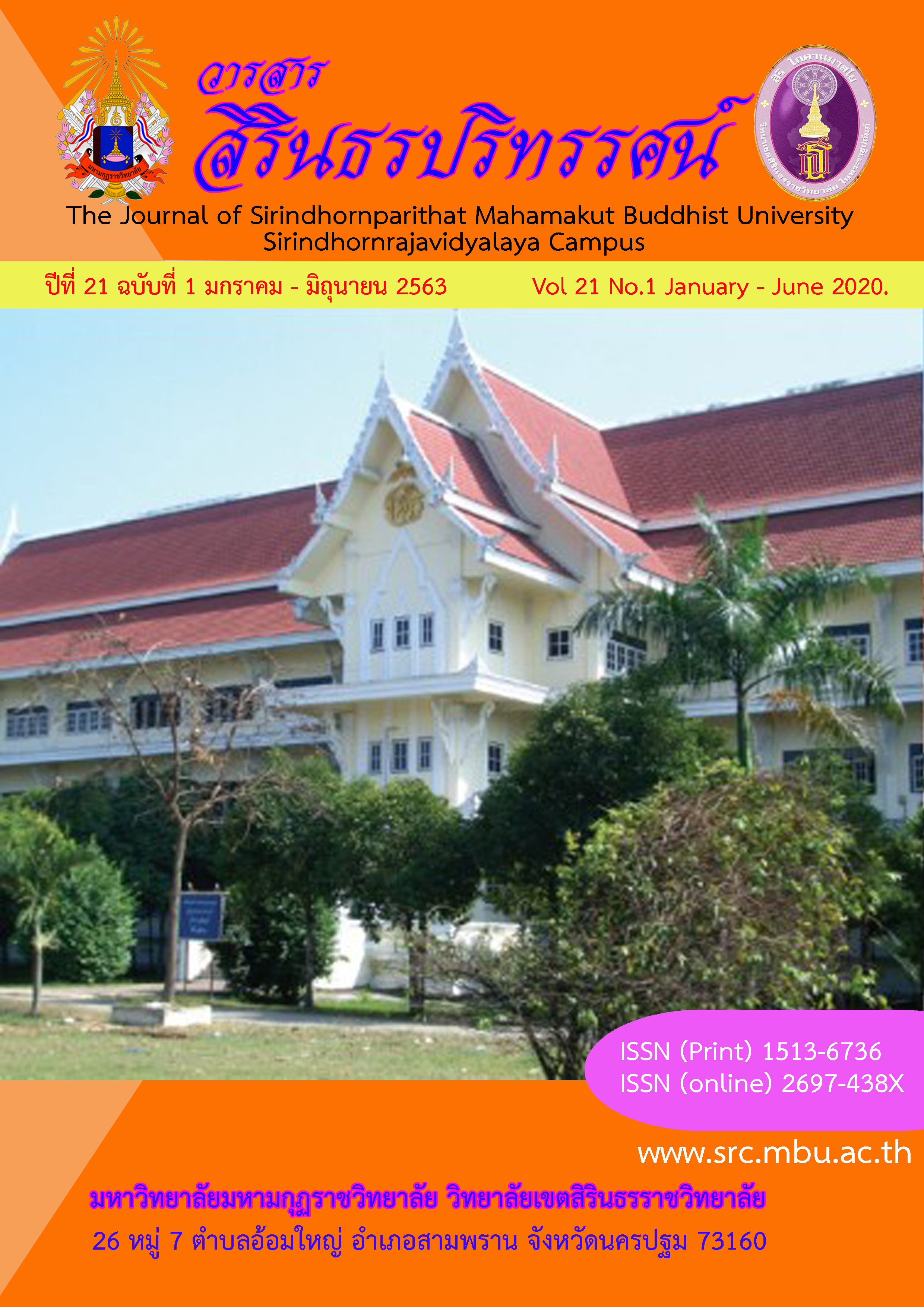Homestay Management Strategies for Happiness Workplace of Ban So Buddhism-Based Agriculture Village, Phayao Province
Keywords:
Homestay management, Ban So Village, Buddhism-based agricultural villageAbstract
The research on homestay management strategies for happiness workplace of Ban So, Buddhism-based agriculture village, Phayao Province was a qualitative research, survey research and action research. It aimed at studying and indicating home stay management direction for happiness workplace of Ban So, Buddhism-based agriculture village, Phayao Province. The researchers conducted research by undertaking a seminar-based assessment of SWOT Analysis and in-depth interview to exchange knowledge among informants in particular issues. The population and samples included 15 informants of specialists in tourism and hospitality who are officers from government sectors, entrepreneurs of tourism and hospitality business and community leaders.
The studies revealed that homestay management strategies for happiness workplace of Ban So, Buddhism-based agriculture village, Phayao Province, included; 1) promote the extensive marketing campaigns by homestay entrepreneurs 2) develop the form of Buddhism-based agricultural tourism by blended with culture for happiness workplace of Ban So to highlight its distinction with creativity of the community 3) focusing on maintaining homestay standard by encouraging the owner to participate in standardized evaluation process of the Department of Tourism 4) initiate collaboration with local administrative organizations 5) initiate collaboration with educational organizations 6) support the use of various public relation media to broaden target approach 7) initiate tourism-cluster collaboration with government organizations to propose homestay maintenance budget 8) develop body of knowledge in hospitality to enhance service standard of staff 9) forecast annual prospective guests for sufficiency workforce management 10) adjust and learn with community sector, government sector and private sector 11) host the panels as to knowledge sharing and thoroughly communicate among entrepreneurs 12) management of environment, community income and inheriting of knowledge 13) entirely cooperate to develop community learning sites 14) entirely cooperate to establish community museum.
References
กมล วงศ์อนันต์ และอภิชา ประกอบเส้ง. (2555). SWOT Analysis. สืบค้นเมื่อ 11 กันยายน 2562, http://applerakchon.blogspot.com/2012/10/12-swot-analysis.html
กรมสุขภาพจิต. (2553). ความฉลาดทางอารมณ์. กรุงเทพฯ: กรมสุขภาพจิต.
ฐิตินันท์ พงษ์คะเชนทร์ และประยุทธ สุวรรณศรี. (2561). กลยุทธ์การให้บริการที่พักแบบสัมผัสวัฒนธรรม (Homestay) เพื่อเข้าสู่มาตรฐานโฮมสเตย์ไทย: กรณีศึกษาโฮมสเตย์นาขุนแสน อำเภอสวนผึ้ง จังหวัดราชบุรี. รายงานการวิจัย มหาวิทยาลัยเทคโนโลยีราชมงคลพระนคร.
ณัฎฐ์ชรัชช์ สาระหงส์. (2561). ที่ทำการศึกษาเรื่องศักยภาพทางวัฒนธรรมของชาวปกาเกอะญอ: พลวัตการจัดการท่องเที่ยวทางวัฒนธรรมโดยชุมชน จังหวัดแม่ฮ่องสอน. วารสารวิชาการเครือข่ายบัณฑิตศึกษามหาวิทยาลัยราชภัฏภาคเหนือ. ปีที่ 8 เล่มที่ 14 มกราคม – มิถุนายน 2561.
ปานแพร เชาวน์ประยูร. (2556). การประเมินกิจกรรมการท่องเที่ยวแบบที่พักสัมผัสวัฒนธรรมชนบท (Home Stay) บ้านเมืองขอน ตำบลป่าไผ่ อำเภอสันทราย จังหวัดเชียงใหม่. รายงานการวิจัย มหาวิทยาลัยแม่โจ้.
ฤทัยภัทร พิมลศรี. (2557). การตามหาปลาร้องเพลงที่กว๊านพะเยา จังหวัดพะเยา; ต้นแบบการพัฒนาการท่องเที่ยวเชิงนิเวศโดยชุมชนจากความหลากหลายทางชีวภาพและภูมิปัญญาด้านประมง. รายงานการวิจัย. มหาวิทยาลัยพะเยา.
องค์การบริหารส่วนตำบลแม่นาเรือ. (2561). ข้อมูลบ้านโซ้หมู่ 2. สืบค้นเมื่อ 1 พฤษภาคม 2562. จาก www.maenarua.com/index.php/หมู่-2-บ้านโซ้.html.
Downloads
Published
Issue
Section
License
บทความที่ได้รับการตีพิมพ์เป็นลิขสิทธิ์ของ มหาวิทยาลัยมหามกุฏราชวิทยาลัย วิทยาเขตสิรินธรราชวิทยาลัย
ข้อความที่ปรากฏในบทความแต่ละเรื่องในวารสารวิชาการเล่มนี้เป็นความคิดเห็นส่วนตัวของผู้เขียนแต่ละท่านไม่เกี่ยวข้องกับหาวิทยาลัยมหามกุฏราชวิทยาลัย วิทยาเขตสิรินธรราชวิทยาลัย และคณาจารย์ท่านอื่นๆในมหาวิทยาลัยฯ แต่อย่างใด ความรับผิดชอบองค์ประกอบทั้งหมดของบทความแต่ละเรื่องเป็นของผู้เขียนแต่ละท่าน หากมีความผิดพลาดใดๆ ผู้เขียนแต่ละท่านจะรับผิดชอบบทความของตนเองแต่ผู้เดียว




